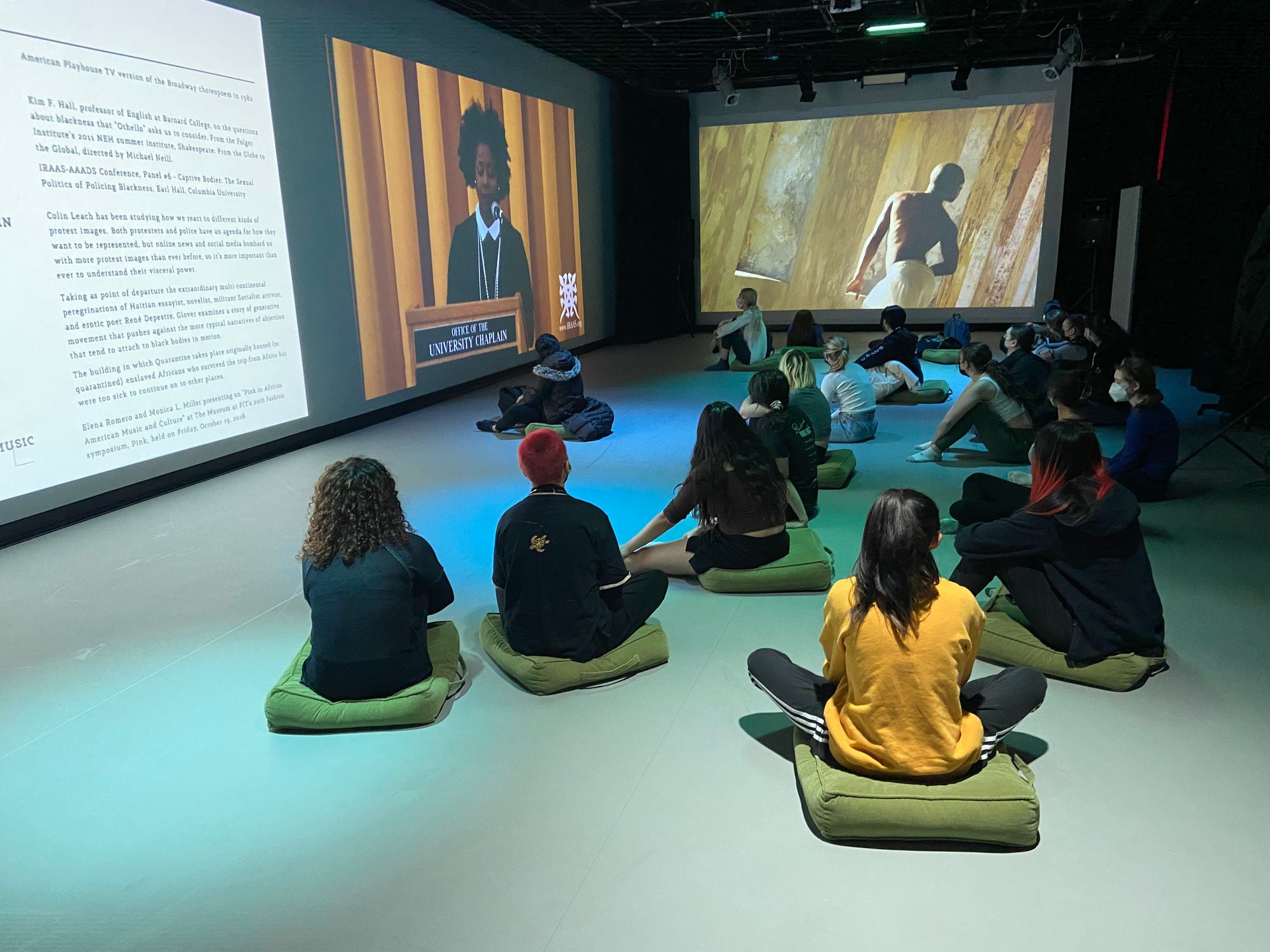🎙️ Black Faculty Salon
April 21, 2022
Cite Black Barnard’s inaugural Faculty Salon featured esteemed Barnard Professors Monica L. Miller and Kim F. Hall.

Monica L. Miller, Professor of English and Africana Studies, joined the faculty of Barnard in 2001. Professor Miller specializes in African-American and American literature and cultural studies. Her research interests include twentieth- and twenty-first-century African-American literature, film, and contemporary art; contemporary literature and cultural studies of the black diaspora; performance studies; and intersectional studies of race, gender, and sexuality. Her book, Slaves to Fashion: Black Dandyism and the Styling of Black Diasporic Identity, was published by Duke University Press in 2009. It received the 2010 William Sanders Scarborough Prize for the best book in African American literature and culture from the Modern Language Association; it was shortlisted for the 2010 Modernist Studies Association book prize. Professor Miller is the recipient of grants from the Andrew W. Mellon Foundation (2012, 2001), the Schomburg Center for Research in Black Culture (2004), and Woodrow Wilson National Fellowship Foundation (2004). She served as a Term Fellow at Institute for Research in African American Studies, Columbia University (2011-13). She was the recipient of the Gladys Brooks Junior Faculty Excellence in Teaching Award, Barnard College (2008). She is currently at work on Blackness, Swedish Style: Figuring Blackness in a Place without Race, which is a multi-genre investigation of multiculturalism, integration, and Afro-Swedishness in relation to Black European Studies and theories of diaspora and diasporic belonging. Documenting and theorizing the emergence of “blackness” in a place that has no obvious or well-developed colonial or imperial history, Blackness Swedish Style thinks differently about “diaspora” and the identities that emerge from it. Investigating connections and disconnections between Europe, Sweden and its African Diaspora, as well as among AfroSwedes themselves, this book is a diverse volume consisting of theory, ethnography, memoir, (oral) history, and contemporary cultural criticism.

Kim F. Hall is Lucyle Hook Professor of English and Professor of Africana Studies at Barnard College. Her research covers Renaissance/Early Modern Literature and Culture, Critical Race Theory, Black Feminist Studies, Slavery Studies, Visual Culture, Food Studies, and Digital Humanities. She has been recognized for her approach to both learning and scholarship, having been awarded a Tow Award for Innovative Pedagogy in 2015 and named one of the 25 “Women Making a Difference in Higher Education and Beyond” by Diverse Issues in Higher Education in 2016.
Throughout the evening, the scholars shared reflections on navigating the world of academia as Black women scholars.
Their discussion ranged across topics, from the injustices and possibilities of the archive, to developing a framework that centers Black people and their humanity, to the importance of rest and community in fighting burnout.
Monica L. Miller: Yes, I was interested in the theory, but it’s always about the people. So part of my writing process is making sure I’m always attending to that. Especially when you write about fashion, which people think is frivolous. It’s really important to think about how it matters to the people.
View full event recap ➡️
📽️ Cite Black Barnard Installation
February 28, 2022 - March 4, 2022
Partnering with the Movement Lab at the Milstein Center, our first installation included:
- Short excerpts from scholarly or popular articles written by Black Barnard faculty
- Images relevant to their work
- An edited compilation of clips from their lectures and performances.

This exhibit provided an immersive engagement in Barnard faculty work, which can connect to classes in which these texts are taught, as well as bringing in community members who might not otherwise experience the project.
View full event recap ➡️
📝 Faculty & Staff Cite-a-Thon
February 10, 2022
Kicking off our spring programming, as well as Black History Month, the second annual Faculty & Staff Cite-A-Thon presented the opportunity for Faculty and Staff to collaborate on a resource prioritizing recognition of the contributions Black Barnard faculty members make to scholarship, public intellectual life, and throughout the arts.
During the event, participants were able to read and engage with scholarly and artistic material by Black Barnard faculty.
Thanks to our attendees, four new citations were written for four texts by Black Barnard faculty! ⚡️
“I keep hearing people wrestle with an important but never-ending question: ‘Does change happen from the bottom up or the top down?’
If I am doing my thinking work in my corner, where does it go—does it radiate up/down/outward/anywhere? Who is organizing it all?’ I think these questions come from a feeling of isolation—like, who is paying attention? Who is listening? Is change happening?
This intro to the special issue of BCRW’s Scholar and Feminist beautifully celebrates and honors the work of Ntozoke Shange -- and in doing so, lovingly reorients, maybe even rejects, the above questions.” View full citation ➡️ - Prof. Cecelia Lie-Spahn, English & First Year Foundation



